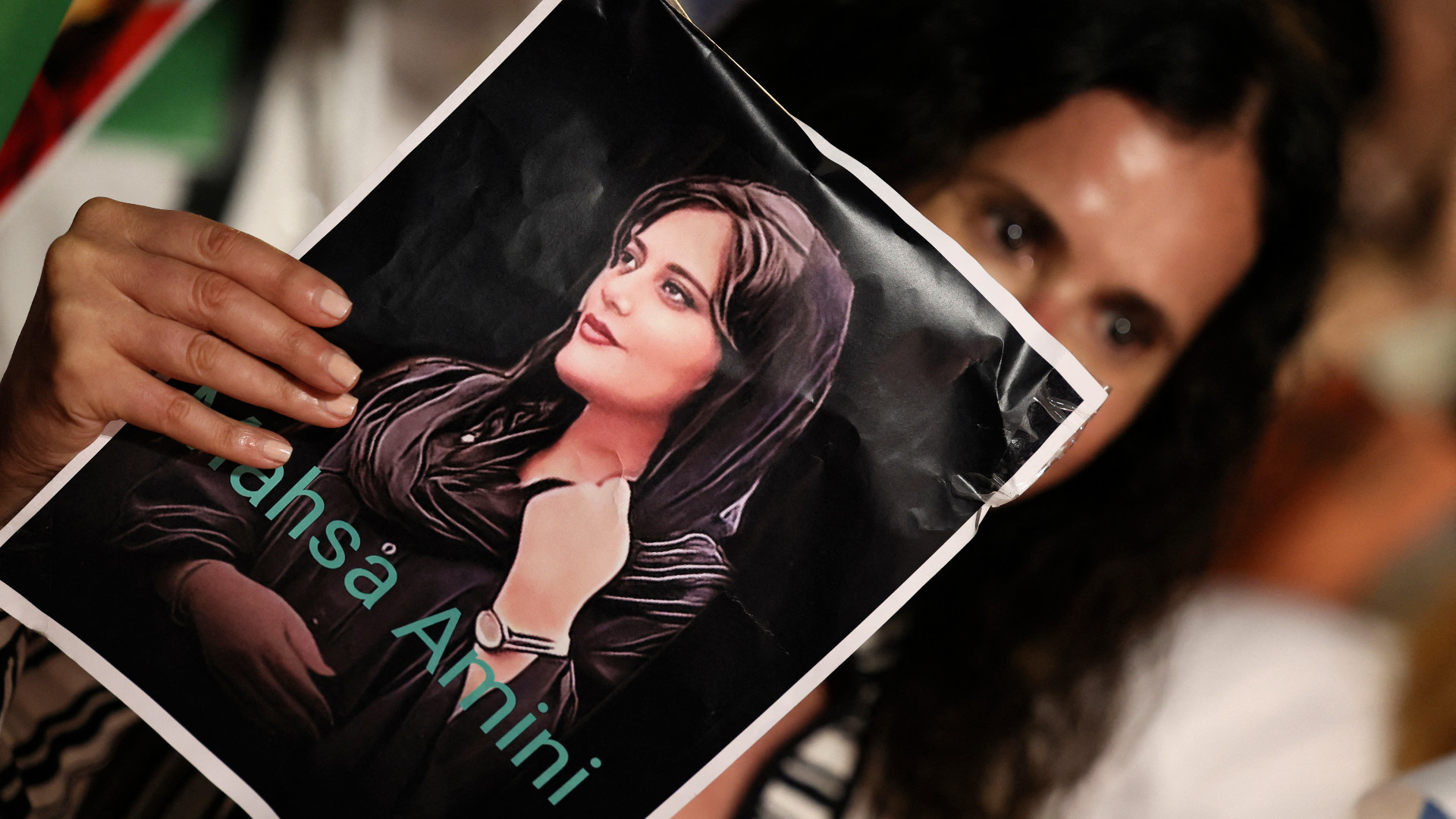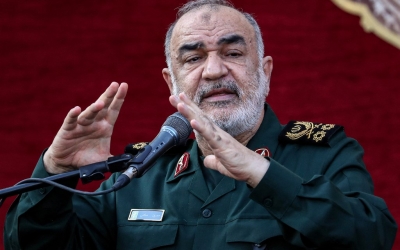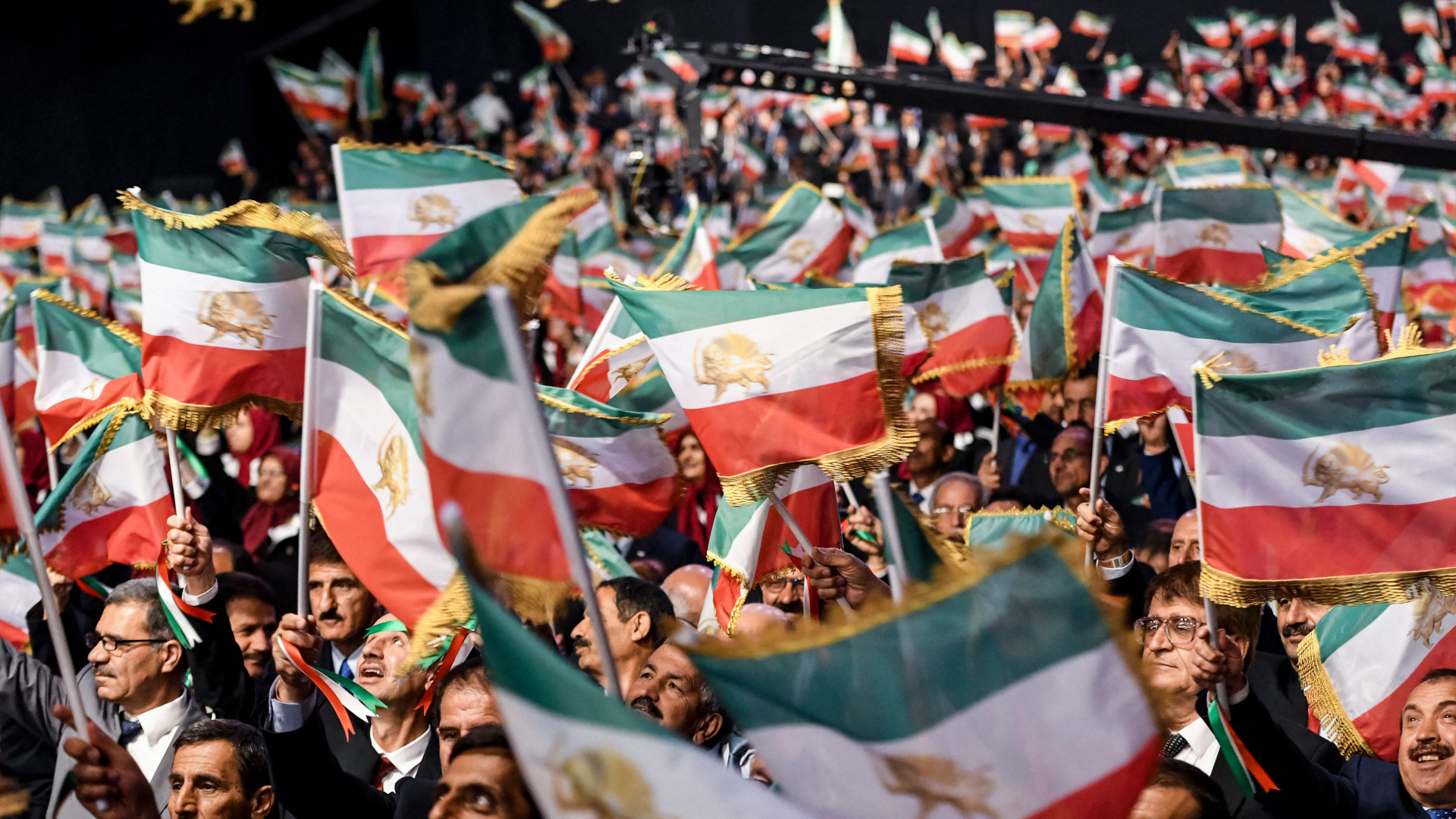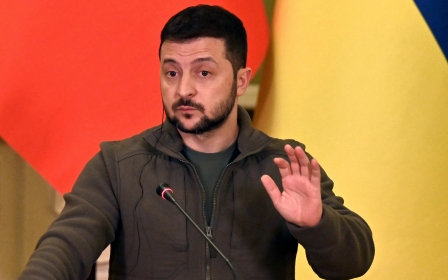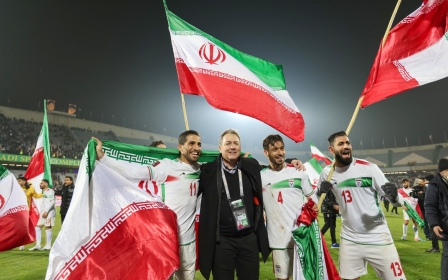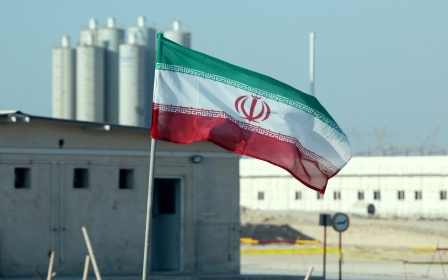Iran protests: Diaspora Iranians plagued by online harassment campaign
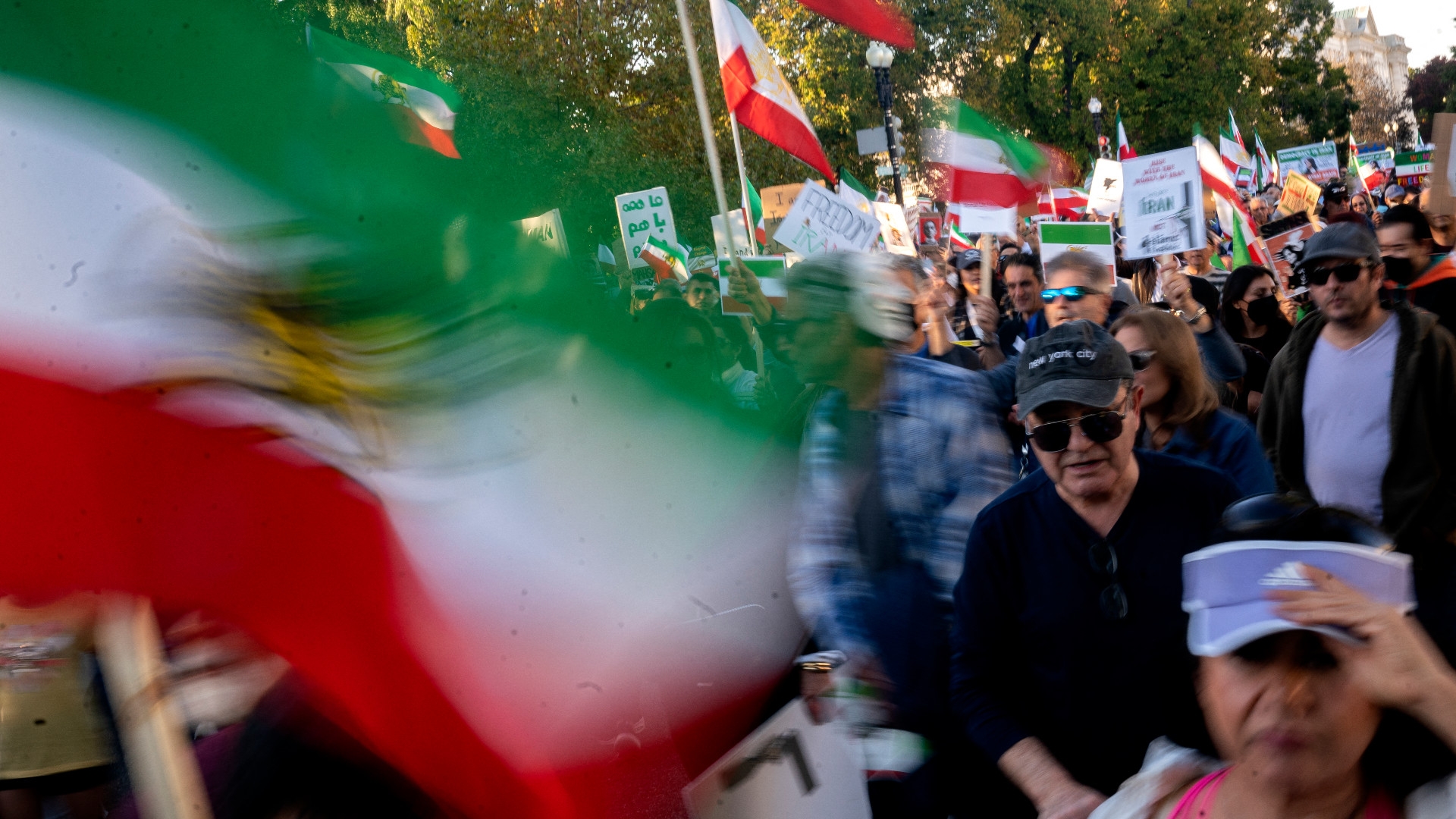
Negar Mortazavi is an Iranian journalist and commentator who for many years has been seen as a leading authority on the country and its place in the world.
Like many in the Iranian diaspora, she regards herself as an "exile" from the land in which she was born, and has faced harassment from the Iranian government over her work.
Despite this, she has also for years faced repeated accusations of being an apologist or outright agent of the Islamic Republic. Her tweets are bombarded from an array of accounts - many created expressly to troll - calling her a "liar" or warning that she will "pay the price" for her alleged support of the government.
Videos and photos have been posted and edited to show her endorsing the Islamic Republic, while media outlets such as the Jerusalem Post and Alarabiya have also denounced her as pro-regime.
'I'm on the edge. I feel threatened, I receive death threats. I fear for my safety'
- Negar Mortazavi, journalist
Since the beginning of protests in Iran last month over the death of 22-year-old Kurdish woman Mahsa Amini, the campaign against Mortazavi has intensified. At one point she was forced to move an event at the University of Chicago online due to threats, which later included a bomb threat.
"I'm on the edge. I feel threatened, I receive death threats. I fear for my safety," she told Middle East Eye.
She's not alone.
A number of journalists, activists and analysts in the Iranian diaspora are becoming increasingly concerned by a campaign of "inauthentic coordinated activity" to discredit and silence them.
Farnaz Fassihi, a reporter at the New York Times, has been subjected to widespread abuse online by apparent members of the Iranian diaspora over what they claimed was apologism for the Islamic Republic in her reporting.
An article that provoked particular ire was published on 2 October under the title, "'Out-of-Reach Dreams' in a Sickly Economy Provoke the Rage in Iran". The piece detailed how a combination of US sanctions and government corruption had helped spark the Amini protests.
The implication that US actions played a role in degrading Iran's economy was what did it.
A petition was circulated with more than 15,000 signatures calling on the New York Times to "investigate" Fassihi over claims she was suppressing Iranian voices - apparently because she blocked a number of people on Twitter - and that she was "part of the dictatorial regime".
"She has shown more than once that she is favouring a government that the United States of America recognized as a terrorist government and posed [sic] heavy sanctions on them," read the petition, which has since been taken down.
There have been protests held outside the New York Times' offices against Fassihi over what demonstrators called "bias and selective narrative" in her reporting. In the past, people have turned up outside her mother's workplace and harassed her.
"We stand by our reporting of the unrest in Iran, which is led by Farnaz Fassihi, an experienced journalist who has covered the Middle East for the past 25 years," said Charlie Stadtlander, director of external communications, in a statement to MEE.
"As demonstrated through a number of instances recently, Farnaz is regularly and unfairly harassed and threatened for her independent, deeply sourced reporting, which holds Iran's authoritarian leadership to account. We will continue to do so, as our journalists cover the ongoing nationwide anti-government protests."
Others targeted include activist and writer Hoda Katebi, academic Azadeh Moaveni, Human Rights Watch researcher Tara Sepehri Far and virtually anyone working for or associated with the National Iranian American Council (NIAC), an Iranian-American advocacy group founded in 2002 that has long been one of the firmest opponents of military action against Iran and was one of the leading organisations backing the 2015 nuclear deal.
Mortazavi said that while the attacks on her and others were clearly coordinated, the misinformation campaign preyed on the desire of many Iranians living abroad to have some impact on events in Iran, where more than 200 people are thought to have been killed at the hands of the security forces.
"Iranians are angry, they're furious in the diaspora," she explained.
"They're also powerless - they can't touch that main source of tyranny and violence, and they're looking for soft targets."
'Explosion of disinformation'
The Iranian diaspora is home to a wide range of political factions, with a range of ideologies. From Kurdish, Arab, Baloch and Azeri separatists, to communists, dissident Islamists, secular nationalists and monarchists: a mix of voices that often have little in common except for their opposition to the Islamic Republic.
One major point of contention between them has been the question of sanctions. Some diaspora groups have supported their imposition on Iran, citing a need to stifle the country's ability to operate in international markets and target the finances of government officials.
Others have pointed to the damaging impact of sanctions on the lives of ordinary Iranians as officials exploit a growing black market. They back the 2015 nuclear deal to limit Iran's nuclear capabilities in exchange for sanctions relief.
Pro-sanctions groups have regularly accused the pro-nuclear deal groups - many of whom have nothing to do with the Islamic Republic - of being apologists or even agents of the Iranian government, which would make them liable for arrest.
NIAC has long faced protests from diaspora groups and accusations of being a lobby group for the Islamic Republic, though this has never been substantiated and its members (many of them exiles) have always denied it.
"We've seen an explosion of disinformation, but we've also seen a whole community that is sort of vulnerable to be preyed on with that disinformation," said Jamal Abdi, executive director of NIAC.
He noted the irony, too, of the level of misogyny being thrown at female activists and journalists by people who supposedly supported a feminist uprising in Iran.
"It has led to death threats, women being threatened with rape, both online and at freedom rallies, at rallies where people are joining in solidarity to support the rights of the Iranian people who want to be able to be free."
Tracking the trolls
Social media as a battleground for the competing narratives around Iran is not a new phenomenon.
In 2019, the US State Department cut funds for the controversial Iran Disinformation Project, an organisation nominally created to combat Iranian government narratives online but which was accused of engaging in targeted harassment of journalists.
Among those it criticised in its tweets - which were later deleted - were Mortazavi, Sepehri Far and Washington Post journalist Jason Rezaian, who was previously imprisoned in Iran.
It also promoted the hashtag #NIACLobbies4Mullahs which is still active on Twitter.
Despite the loss of funding, and the inactivity of its Twitter account since 2019, it was never entirely clear who was behind the organisation, and its website remains active.
Another group that has become well known for targeting NIAC and other diaspora groups seen as insufficiently anti-regime is the Mujahedin-e-Khalq (MEK), an organisation founded in the 1960s espousing an idiosyncratic mix of Islamism and Marxism. In recent decades it has allied itself with right-wing and neoconservative politicians in the US and elsewhere.
The organisation has been known to run "troll farms" from its base in Albania. These harass and smear diaspora Iranians, while also seeking to dominate the online space by sharing videos and imagery linked to protests in Iran and Europe.
Among those who have accused Fassihi of being a supporter of the Islamic Republic is Heshmat Alavi, an apparent MEK supporter long suspected to be a front used by MEK activists to spread propaganda.
A newsletter allegedly written by Alavi in September 2021 cited an article by Fassihi in which she referred to the assassinated general Qassam Soleimani as “popular” and “universally admired" in Iran as proof of her support for the government.
Tracing the source of other Twitter attacks and accounts is harder.
Geoff Golberg, a researcher and founder of Social Forensics, has written about the apparently coordinated campaign on Twitter to target Iranian-Americans over their alleged Iranian government links.
Many of the accounts spreading the attacks on Mortazavi, Fassihi, NIAC and others have tiny numbers of followers and were created within the past month with the apparent purpose of targeting them.
Many use the hashtag #MahsaAmini in their profiles.
"They use their bios to kind of blast, you know, whatever hashtag it is that the nefarious actors want the wider swath of people to believe that this stuff represents the sort of sentiments of Iranians in Iran," he told MEE.
Golberg said that, ultimately, Twitter's proximity to mainstream media outlets and the propensity to use it as a source of news made it the most useful tool for spreading misinformation.
"I believe that Twitter is actually more important than Facebook, more impactful, more sort of the platform that nefarious actors tend to target in this politically focused flavour of platform manipulation," he said.
On Monday, a number of academics and campaigners released a statement in support of Mortazavi, condemning the abuse and threats directed towards her.
"Attempts to silence or delegitimize Negar by generating or promoting disinformation are not only morally reprehensible, they are a form of incitement that has already manifested into a very real and outrageous threat of violence, and must be rejected by all," it read.
'Too much pressure'
On 28 October it was announced that billionaire Elon Musk had finally succeeded in purchasing Twitter.
The deal to buy the company had stalled previously because of what Musk said were concerns over the presence of "fake and spam" accounts on the platform.
What the South African billionaire's takeover means for the kind of harassment Iranian campaigners and activists experience on the platform remains to be seen.
"If there are state actors behind this, they're not targeting necessarily a huge community - the Iranian diaspora community is in the millions, but like, you know, single digit millions," NIAC's Abdi told MEE.
"And so the ability to kind of pump disinformation, to manipulate a small community like that, I think is really being tested. And we are becoming a case study for the future of disinformation, political warfare."
He added the most tragic thing about the harassment campaigns was the impact it would have on Iranians in the diaspora attempting to get involved in politics in the future.
"We have more Iranian-Americans, primarily women, running for office this year than last year - the trend line is something that I'm so proud of and so hopeful about," he said.
"And now we're seeing that trend line bend and I am seeing people who are saying, like, 'I can't do this. I can't be involved in this line of work. It's too much pressure on me and my family.'"
Middle East Eye propose une couverture et une analyse indépendantes et incomparables du Moyen-Orient, de l’Afrique du Nord et d’autres régions du monde. Pour en savoir plus sur la reprise de ce contenu et les frais qui s’appliquent, veuillez remplir ce formulaire [en anglais]. Pour en savoir plus sur MEE, cliquez ici [en anglais].


